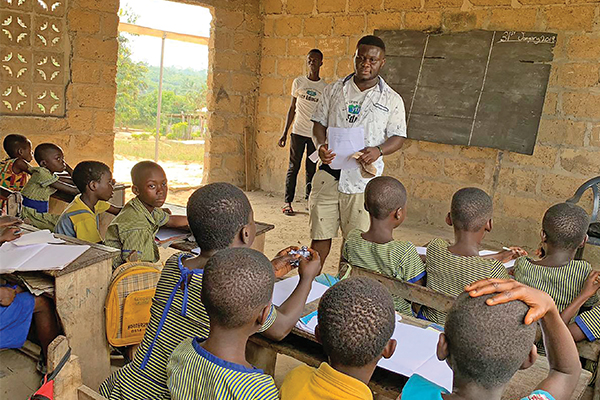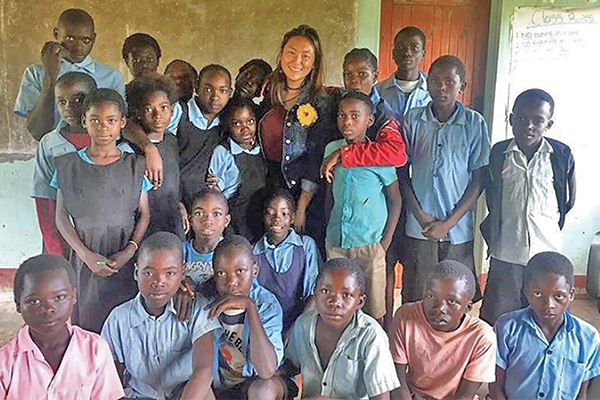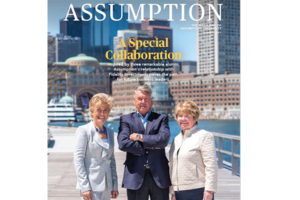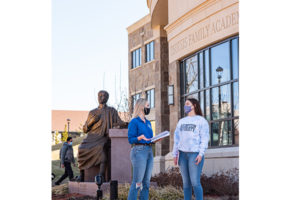
Assumption might appear to be just another small, private New England school. But the reality is that Assumption professors, students, and alumni are making meaningful contributions to international initiatives. Nowhere is this more evident than in Africa.
The Augustinians of the Assumption is a worldwide congregation active in over 30 countries. In Africa, its members have helped establish schools, radio stations, and medical centers as part of its mission to serve the poor.
As one of only two Assumptionist institutions of higher learning in the world, along with UAC: Universite de l’Assomption au Congo (formerly known as ISEAB: Institut Supérieur Emmanuel d’Alzon de Butembo), Assumption is committed to offering resources and expertise on those projects.
In 2016, for instance, two professors from the Business Studies Department, Bart Morrison, Ph.D., and Eric Drouart, led a strategic planning meeting with members of the ISEAB community in Nairobi, Kenya. “This strategic planning work undoubtedly was the basis for the ISEAB being recognized as a university by Congolese authorities,” said Prof. Drouart.
Meanwhile, members of the Assumption community are actively working in other parts of Africa on public health initiatives, education projects, and other endeavors. Three of their stories are highlighted here.
BUILDING A SCHOOL FOR PEACE
One of these projects is the Prince of Peace School Complex in Beni, so named because “we wanted to take children from all tribes and implement a peace curriculum,” he explained.
Fr. John went to the Congo as a young seminarian and taught in a village school for two years before becoming a parish priest and vice president for student life at Assumption. “That experience marked me for life,” he said. “I have a deep love for the country.”
At a 2015 meeting between Assumptionist leaders in Kenya, he was approached by the Provincial in Africa about the desperate situation in Beni, a city in eastern Congo. “The priest told me that the Assumptionist Fathers in Africa wanted to build a school in Beni,” Fr. John said, “and they wanted me to help raise the money.”
Eventually, Fr. John succeeded in doing so. When the school opened in 2017, there were four classrooms serving 90 students. The school has expanded to serve nearly 400 students, and will soon add classes for children in grades seven through nine and offer literacy instruction and vocational training to adults.
When Assumption student government leaders heard about the Prince of Peace School, “they wanted to help raise the funds to provide kids with tuition and school supplies,” said Fr. John.
Students added “Bidding for Beni” to the popular annual Duck Day tradition at the institution, asking community members to bet on the right to name one of the beloved ducks as they return to campus each spring. All proceeds went to the Prince of Peace School.
“Knowledge is power,” said Fr. John, “which is why the school is so important in helping people in the Congo rebuild a broken society. Giving children and adults an education and a way to earn a living sows seeds of hope.”
SHARING KNOWLEDGE
When he returned to his native Ghana for an internship this past spring, Isaac Addai Brobbey ’19 “was determined to draw everyone into my conversation and share the education I’ve received at Assumption.”
As the first graduate of Assumption’s new health sciences program, engaging the Ghanaian people through conversation and earning their trust was imperative: Brobbey was offering life-saving information and instruction in village schools and healthcare centers on topics ranging from CPR to mental health. He and his health team also worked with the president of the local House of Chiefs to curb instances of sexual harassment, rape, and teen pregnancy.
Originally a biology major intent on becoming a doctor, Brobbey switched his major to health sciences after a mission trip to Washington, DC, where he and other Assumption students spent a week engaged in community service that included partnering with people who have mental illnesses and working in a soup kitchen. “I felt so much joy doing this work,” he said. “It made me realize that I don’t want to be a doctor seeing patients in an office. I want to be out in the field, giving back to those who are less fortunate than I am.”
Assistant Professor of Health Sciences Travis Gagen, MPH, Ph.D., helped Brobbey arrange his health sciences internship with Youth Futures International (YFI), a nonprofit organization that provides high school and college students with opportunities to work on international public health initiatives. Prof. Gagen has dedicated his career to practicing and teaching sustainable public health interventions. At Assumption, he hopes to “really open people’s eyes to the worlds of public health and global health and relations,” he said. “My students learn the importance of sustainable health initiatives that empower and educate local populations by equipping them with resources and skills.”
Brobbey is “the first intern I’ve sent anywhere,” he added. “I couldn’t think of a better person to represent Assumption.”

MIXING BUSINESS AND SERVICE
Like Brobbey, Christine Kang ’17 entered Assumption as a biology major. By junior year, she realized she wasn’t “feeling fulfilled” and decided to try a few business courses. Immediately, she knew she’d found her path forward.
One class in particular transformed Kang’s life by marrying her newfound interest in business with her desire to make the world a better place: a global entrepreneurship course taught by Assistant Professor of Management and Marketing Cary Leblanc, Ph.D.
That class inspired her to volunteer for a summer in South Africa, where she worked in a small daycare center. That experience, combined with her active involvement in Assumption’s ALANA (American, Latino, Asian, Native American) cross-cultural group, influenced Kang’s decision to join the Peace Corps after graduation. She is currently serving in a rural Zambian village under the Ministry of Education.
In addition to teaching English and math to middle school students, Kang has spearheaded critical community projects. One of her most important initiatives began when she met an anti-poaching group. “They told me about the serious problem they were having with poachers in a national park near my village,” she said.
Knowing that having an alternative source of income might be the best way to eliminate poaching, Kang searched for “a different income-generating activity.” Eventually, she realized that the best potential business opportunity for the villagers would be manufacturing and selling their own honey, so she started a beekeeping group.
After completing her Peace Corps service, Kang hopes to pursue a career in marketing, preferably for an environmental organization. “I’m grateful to have had such an amazing education and so much support. Now I want to keep sharing my knowledge.


